HR50021E: Equality Act 2010 - Religion or Belief Provisions Analysis
VerifiedAdded on 2023/01/11
|9
|2336
|77
Essay
AI Summary
This essay examines the 'Religion or Belief' provisions of the Equality Act 2010, focusing on the legal framework governing the relationship between employers and employees in the UK. The essay identifies the core principles of the Act, emphasizing the prohibition of discrimination based on religious beliefs and practices. It explores various forms of discrimination, including direct and indirect discrimination, discrimination by association, and harassment. The essay analyzes key literature and case law, such as Gray –v- Mulberry Company (design) Ltd, to illustrate the practical application of the Act and the challenges faced by employers in accommodating religious diversity. It also discusses the implications of the Act for both employers and employees, with a particular focus on the need for employers to create an inclusive workplace, protect employees from discrimination, and provide reasonable accommodations for religious practices. The essay concludes by summarizing the key findings and offering recommendations for employers to ensure compliance with the law and promote a fair and equitable work environment.
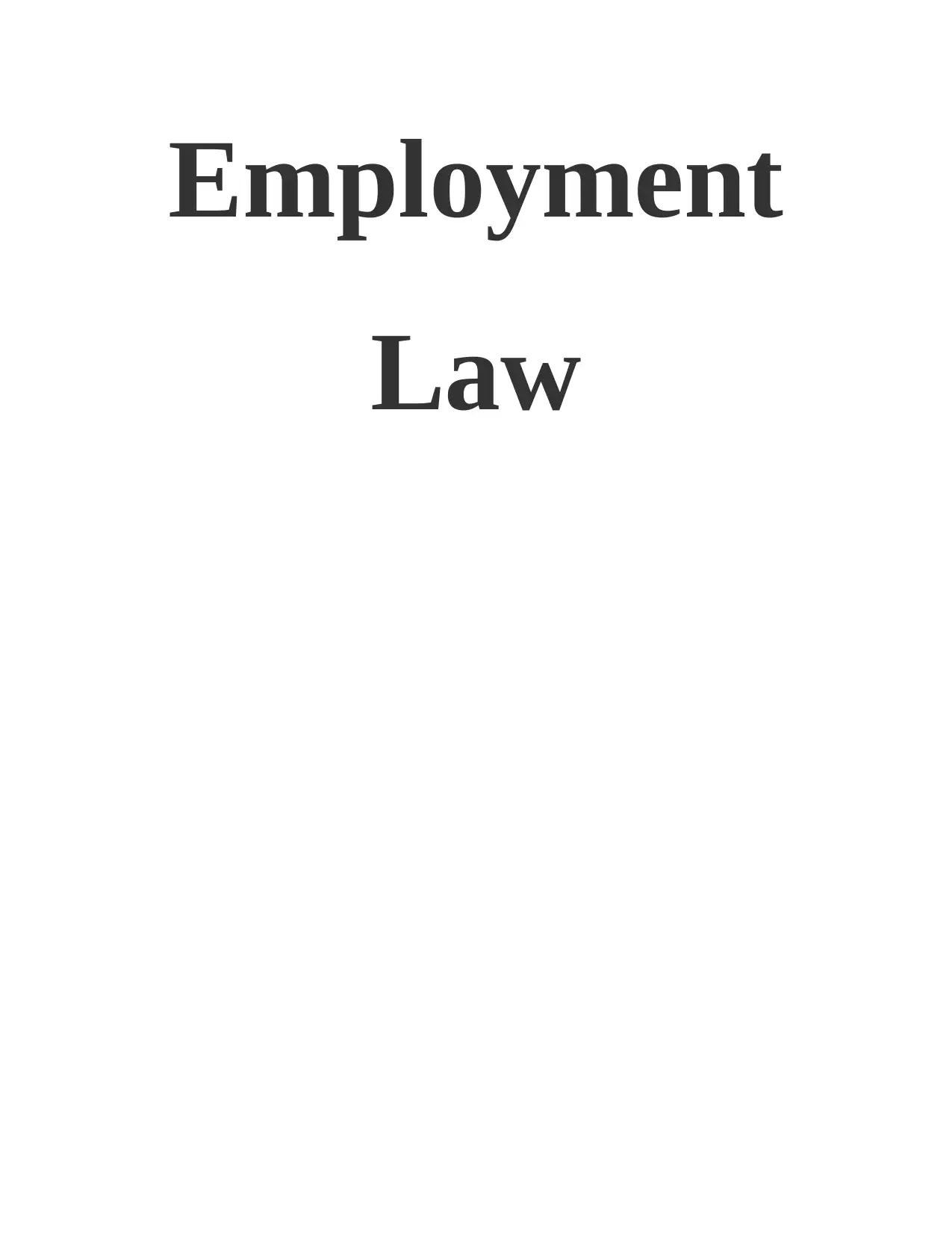
Employment
Law
Law
Paraphrase This Document
Need a fresh take? Get an instant paraphrase of this document with our AI Paraphraser
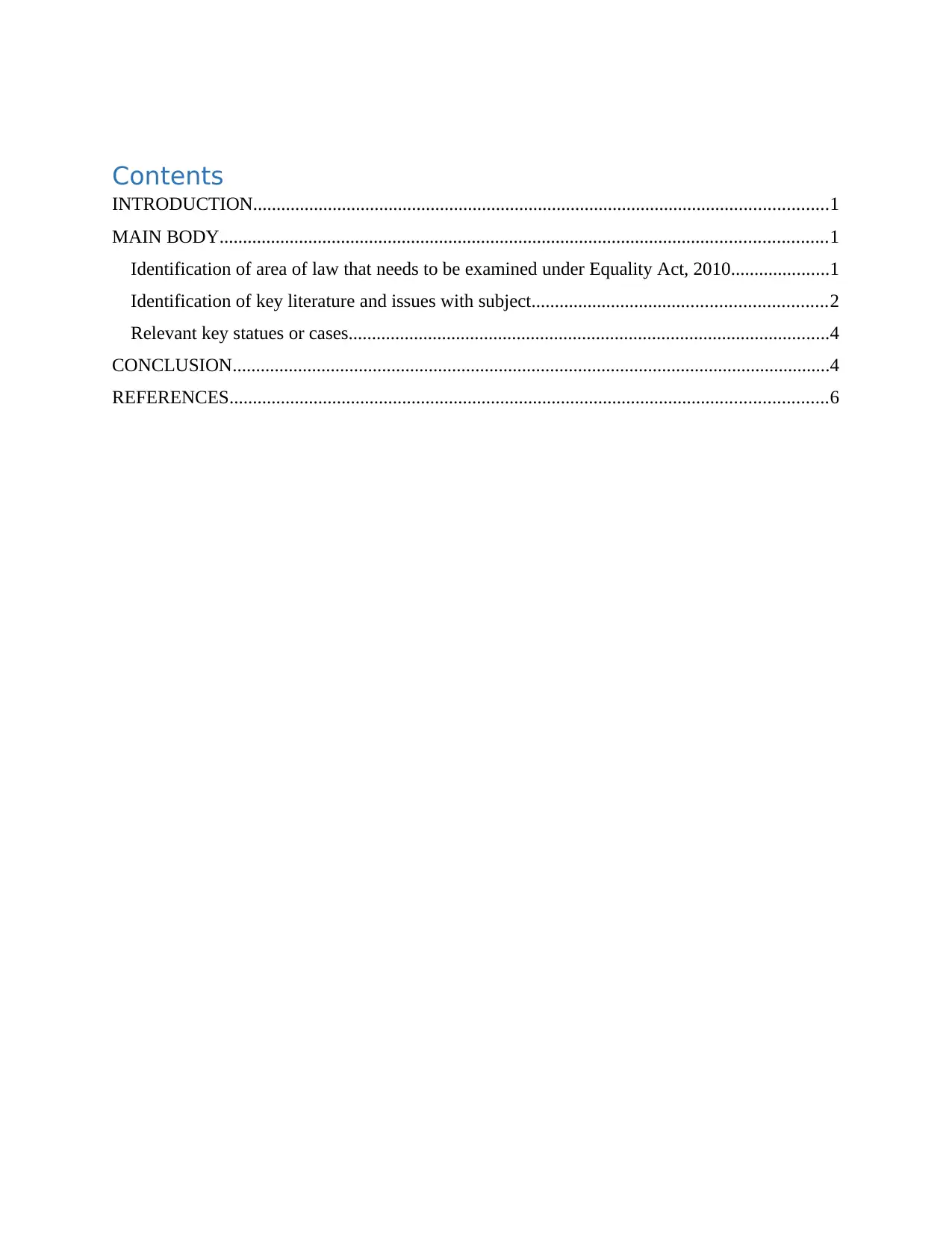
Contents
INTRODUCTION...........................................................................................................................1
MAIN BODY..................................................................................................................................1
Identification of area of law that needs to be examined under Equality Act, 2010.....................1
Identification of key literature and issues with subject...............................................................2
Relevant key statues or cases.......................................................................................................4
CONCLUSION................................................................................................................................4
REFERENCES................................................................................................................................6
INTRODUCTION...........................................................................................................................1
MAIN BODY..................................................................................................................................1
Identification of area of law that needs to be examined under Equality Act, 2010.....................1
Identification of key literature and issues with subject...............................................................2
Relevant key statues or cases.......................................................................................................4
CONCLUSION................................................................................................................................4
REFERENCES................................................................................................................................6
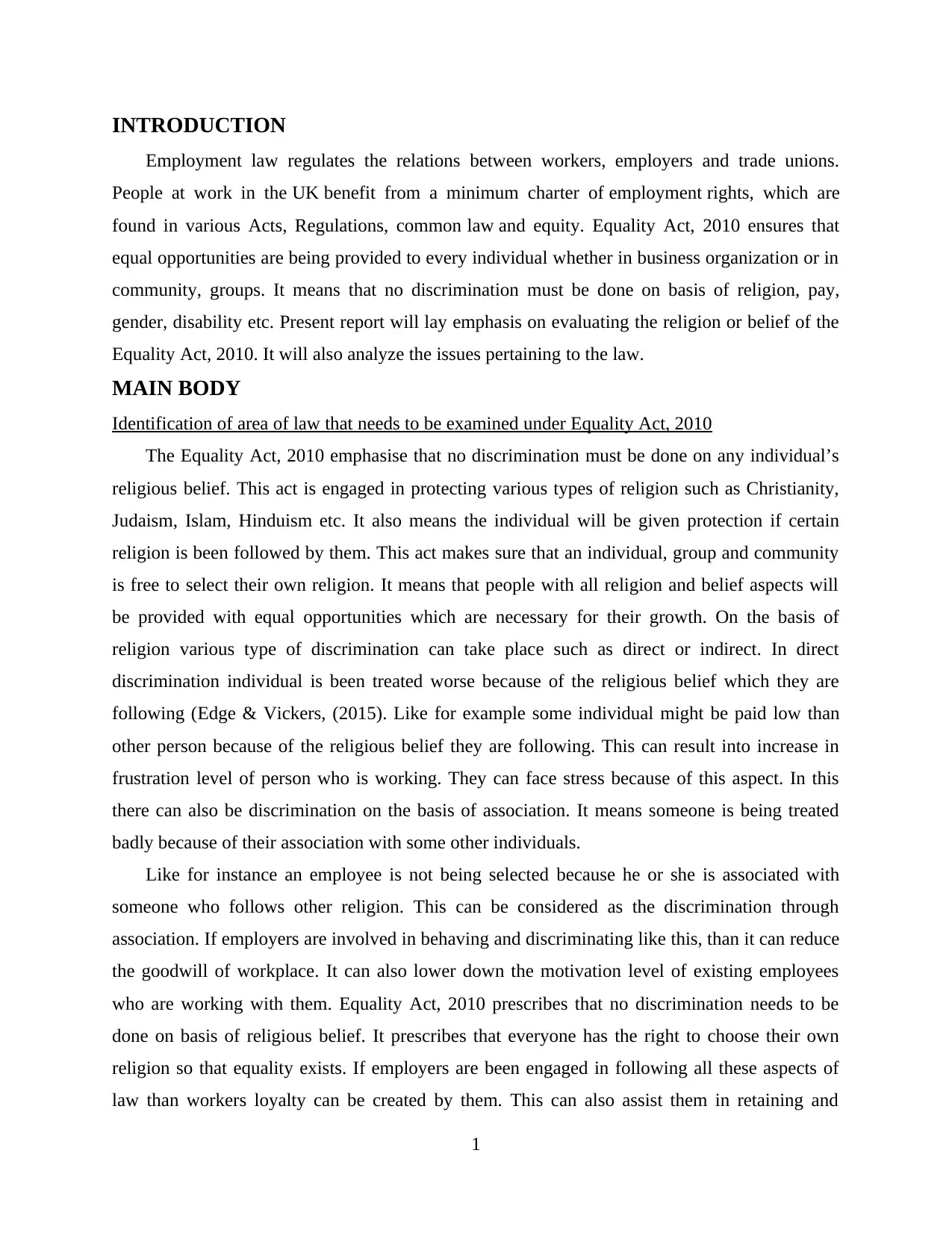
INTRODUCTION
Employment law regulates the relations between workers, employers and trade unions.
People at work in the UK benefit from a minimum charter of employment rights, which are
found in various Acts, Regulations, common law and equity. Equality Act, 2010 ensures that
equal opportunities are being provided to every individual whether in business organization or in
community, groups. It means that no discrimination must be done on basis of religion, pay,
gender, disability etc. Present report will lay emphasis on evaluating the religion or belief of the
Equality Act, 2010. It will also analyze the issues pertaining to the law.
MAIN BODY
Identification of area of law that needs to be examined under Equality Act, 2010
The Equality Act, 2010 emphasise that no discrimination must be done on any individual’s
religious belief. This act is engaged in protecting various types of religion such as Christianity,
Judaism, Islam, Hinduism etc. It also means the individual will be given protection if certain
religion is been followed by them. This act makes sure that an individual, group and community
is free to select their own religion. It means that people with all religion and belief aspects will
be provided with equal opportunities which are necessary for their growth. On the basis of
religion various type of discrimination can take place such as direct or indirect. In direct
discrimination individual is been treated worse because of the religious belief which they are
following (Edge & Vickers, (2015). Like for example some individual might be paid low than
other person because of the religious belief they are following. This can result into increase in
frustration level of person who is working. They can face stress because of this aspect. In this
there can also be discrimination on the basis of association. It means someone is being treated
badly because of their association with some other individuals.
Like for instance an employee is not being selected because he or she is associated with
someone who follows other religion. This can be considered as the discrimination through
association. If employers are involved in behaving and discriminating like this, than it can reduce
the goodwill of workplace. It can also lower down the motivation level of existing employees
who are working with them. Equality Act, 2010 prescribes that no discrimination needs to be
done on basis of religious belief. It prescribes that everyone has the right to choose their own
religion so that equality exists. If employers are been engaged in following all these aspects of
law than workers loyalty can be created by them. This can also assist them in retaining and
1
Employment law regulates the relations between workers, employers and trade unions.
People at work in the UK benefit from a minimum charter of employment rights, which are
found in various Acts, Regulations, common law and equity. Equality Act, 2010 ensures that
equal opportunities are being provided to every individual whether in business organization or in
community, groups. It means that no discrimination must be done on basis of religion, pay,
gender, disability etc. Present report will lay emphasis on evaluating the religion or belief of the
Equality Act, 2010. It will also analyze the issues pertaining to the law.
MAIN BODY
Identification of area of law that needs to be examined under Equality Act, 2010
The Equality Act, 2010 emphasise that no discrimination must be done on any individual’s
religious belief. This act is engaged in protecting various types of religion such as Christianity,
Judaism, Islam, Hinduism etc. It also means the individual will be given protection if certain
religion is been followed by them. This act makes sure that an individual, group and community
is free to select their own religion. It means that people with all religion and belief aspects will
be provided with equal opportunities which are necessary for their growth. On the basis of
religion various type of discrimination can take place such as direct or indirect. In direct
discrimination individual is been treated worse because of the religious belief which they are
following (Edge & Vickers, (2015). Like for example some individual might be paid low than
other person because of the religious belief they are following. This can result into increase in
frustration level of person who is working. They can face stress because of this aspect. In this
there can also be discrimination on the basis of association. It means someone is being treated
badly because of their association with some other individuals.
Like for instance an employee is not being selected because he or she is associated with
someone who follows other religion. This can be considered as the discrimination through
association. If employers are involved in behaving and discriminating like this, than it can reduce
the goodwill of workplace. It can also lower down the motivation level of existing employees
who are working with them. Equality Act, 2010 prescribes that no discrimination needs to be
done on basis of religious belief. It prescribes that everyone has the right to choose their own
religion so that equality exists. If employers are been engaged in following all these aspects of
law than workers loyalty can be created by them. This can also assist them in retaining and
1
⊘ This is a preview!⊘
Do you want full access?
Subscribe today to unlock all pages.

Trusted by 1+ million students worldwide
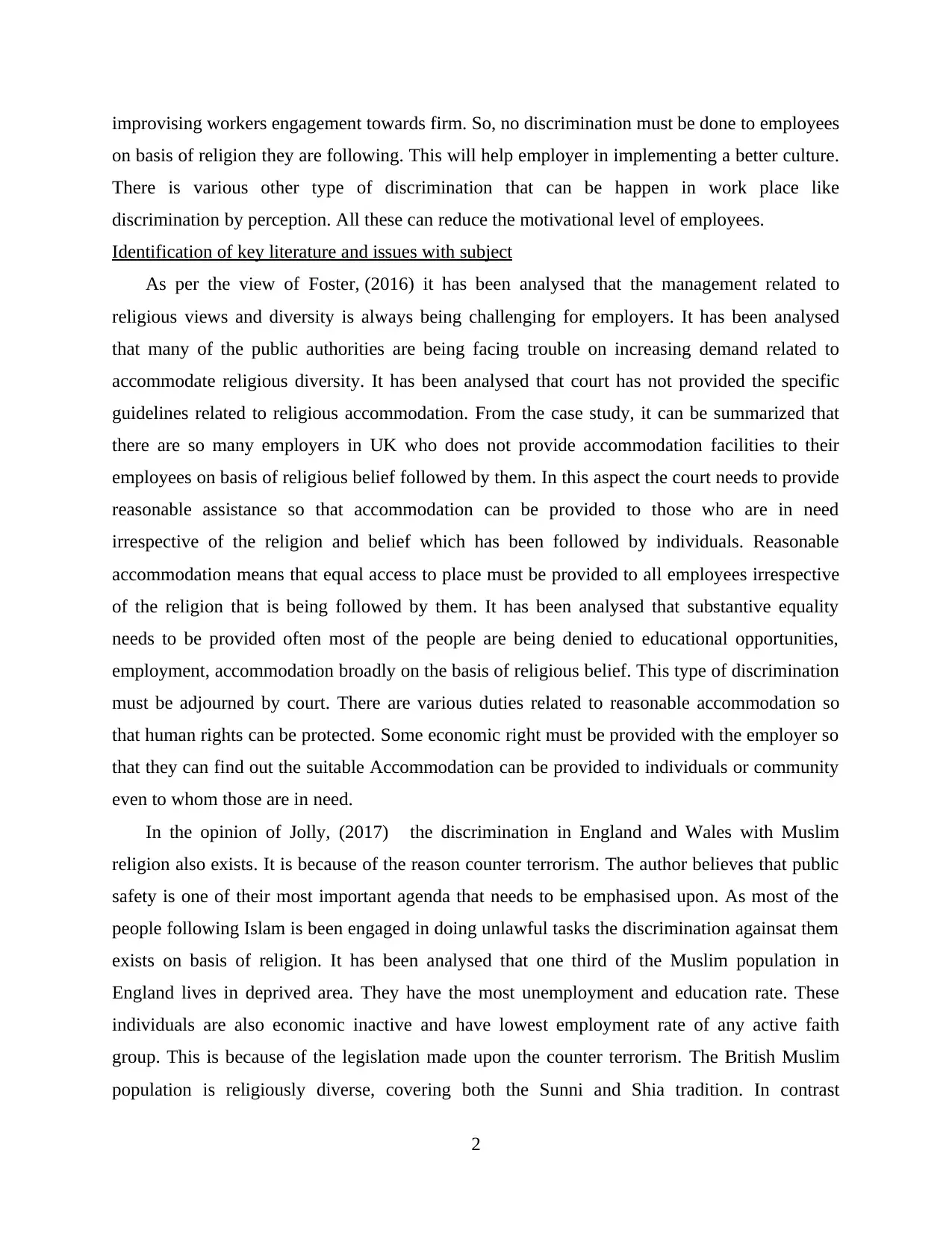
improvising workers engagement towards firm. So, no discrimination must be done to employees
on basis of religion they are following. This will help employer in implementing a better culture.
There is various other type of discrimination that can be happen in work place like
discrimination by perception. All these can reduce the motivational level of employees.
Identification of key literature and issues with subject
As per the view of Foster, (2016) it has been analysed that the management related to
religious views and diversity is always being challenging for employers. It has been analysed
that many of the public authorities are being facing trouble on increasing demand related to
accommodate religious diversity. It has been analysed that court has not provided the specific
guidelines related to religious accommodation. From the case study, it can be summarized that
there are so many employers in UK who does not provide accommodation facilities to their
employees on basis of religious belief followed by them. In this aspect the court needs to provide
reasonable assistance so that accommodation can be provided to those who are in need
irrespective of the religion and belief which has been followed by individuals. Reasonable
accommodation means that equal access to place must be provided to all employees irrespective
of the religion that is being followed by them. It has been analysed that substantive equality
needs to be provided often most of the people are being denied to educational opportunities,
employment, accommodation broadly on the basis of religious belief. This type of discrimination
must be adjourned by court. There are various duties related to reasonable accommodation so
that human rights can be protected. Some economic right must be provided with the employer so
that they can find out the suitable Accommodation can be provided to individuals or community
even to whom those are in need.
In the opinion of Jolly, (2017) the discrimination in England and Wales with Muslim
religion also exists. It is because of the reason counter terrorism. The author believes that public
safety is one of their most important agenda that needs to be emphasised upon. As most of the
people following Islam is been engaged in doing unlawful tasks the discrimination againsat them
exists on basis of religion. It has been analysed that one third of the Muslim population in
England lives in deprived area. They have the most unemployment and education rate. These
individuals are also economic inactive and have lowest employment rate of any active faith
group. This is because of the legislation made upon the counter terrorism. The British Muslim
population is religiously diverse, covering both the Sunni and Shia tradition. In contrast
2
on basis of religion they are following. This will help employer in implementing a better culture.
There is various other type of discrimination that can be happen in work place like
discrimination by perception. All these can reduce the motivational level of employees.
Identification of key literature and issues with subject
As per the view of Foster, (2016) it has been analysed that the management related to
religious views and diversity is always being challenging for employers. It has been analysed
that many of the public authorities are being facing trouble on increasing demand related to
accommodate religious diversity. It has been analysed that court has not provided the specific
guidelines related to religious accommodation. From the case study, it can be summarized that
there are so many employers in UK who does not provide accommodation facilities to their
employees on basis of religious belief followed by them. In this aspect the court needs to provide
reasonable assistance so that accommodation can be provided to those who are in need
irrespective of the religion and belief which has been followed by individuals. Reasonable
accommodation means that equal access to place must be provided to all employees irrespective
of the religion that is being followed by them. It has been analysed that substantive equality
needs to be provided often most of the people are being denied to educational opportunities,
employment, accommodation broadly on the basis of religious belief. This type of discrimination
must be adjourned by court. There are various duties related to reasonable accommodation so
that human rights can be protected. Some economic right must be provided with the employer so
that they can find out the suitable Accommodation can be provided to individuals or community
even to whom those are in need.
In the opinion of Jolly, (2017) the discrimination in England and Wales with Muslim
religion also exists. It is because of the reason counter terrorism. The author believes that public
safety is one of their most important agenda that needs to be emphasised upon. As most of the
people following Islam is been engaged in doing unlawful tasks the discrimination againsat them
exists on basis of religion. It has been analysed that one third of the Muslim population in
England lives in deprived area. They have the most unemployment and education rate. These
individuals are also economic inactive and have lowest employment rate of any active faith
group. This is because of the legislation made upon the counter terrorism. The British Muslim
population is religiously diverse, covering both the Sunni and Shia tradition. In contrast
2
Paraphrase This Document
Need a fresh take? Get an instant paraphrase of this document with our AI Paraphraser
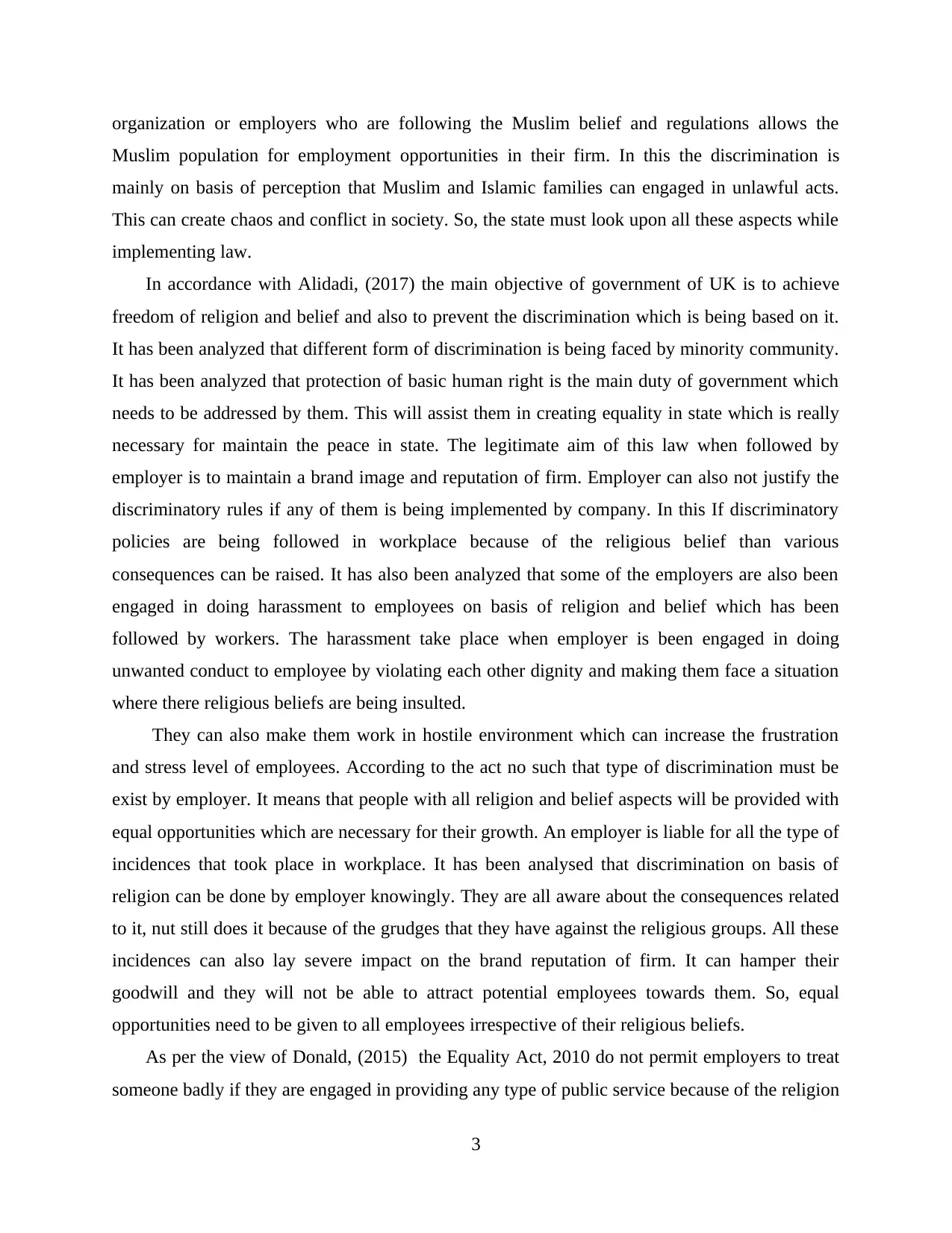
organization or employers who are following the Muslim belief and regulations allows the
Muslim population for employment opportunities in their firm. In this the discrimination is
mainly on basis of perception that Muslim and Islamic families can engaged in unlawful acts.
This can create chaos and conflict in society. So, the state must look upon all these aspects while
implementing law.
In accordance with Alidadi, (2017) the main objective of government of UK is to achieve
freedom of religion and belief and also to prevent the discrimination which is being based on it.
It has been analyzed that different form of discrimination is being faced by minority community.
It has been analyzed that protection of basic human right is the main duty of government which
needs to be addressed by them. This will assist them in creating equality in state which is really
necessary for maintain the peace in state. The legitimate aim of this law when followed by
employer is to maintain a brand image and reputation of firm. Employer can also not justify the
discriminatory rules if any of them is being implemented by company. In this If discriminatory
policies are being followed in workplace because of the religious belief than various
consequences can be raised. It has also been analyzed that some of the employers are also been
engaged in doing harassment to employees on basis of religion and belief which has been
followed by workers. The harassment take place when employer is been engaged in doing
unwanted conduct to employee by violating each other dignity and making them face a situation
where there religious beliefs are being insulted.
They can also make them work in hostile environment which can increase the frustration
and stress level of employees. According to the act no such that type of discrimination must be
exist by employer. It means that people with all religion and belief aspects will be provided with
equal opportunities which are necessary for their growth. An employer is liable for all the type of
incidences that took place in workplace. It has been analysed that discrimination on basis of
religion can be done by employer knowingly. They are all aware about the consequences related
to it, nut still does it because of the grudges that they have against the religious groups. All these
incidences can also lay severe impact on the brand reputation of firm. It can hamper their
goodwill and they will not be able to attract potential employees towards them. So, equal
opportunities need to be given to all employees irrespective of their religious beliefs.
As per the view of Donald, (2015) the Equality Act, 2010 do not permit employers to treat
someone badly if they are engaged in providing any type of public service because of the religion
3
Muslim population for employment opportunities in their firm. In this the discrimination is
mainly on basis of perception that Muslim and Islamic families can engaged in unlawful acts.
This can create chaos and conflict in society. So, the state must look upon all these aspects while
implementing law.
In accordance with Alidadi, (2017) the main objective of government of UK is to achieve
freedom of religion and belief and also to prevent the discrimination which is being based on it.
It has been analyzed that different form of discrimination is being faced by minority community.
It has been analyzed that protection of basic human right is the main duty of government which
needs to be addressed by them. This will assist them in creating equality in state which is really
necessary for maintain the peace in state. The legitimate aim of this law when followed by
employer is to maintain a brand image and reputation of firm. Employer can also not justify the
discriminatory rules if any of them is being implemented by company. In this If discriminatory
policies are being followed in workplace because of the religious belief than various
consequences can be raised. It has also been analyzed that some of the employers are also been
engaged in doing harassment to employees on basis of religion and belief which has been
followed by workers. The harassment take place when employer is been engaged in doing
unwanted conduct to employee by violating each other dignity and making them face a situation
where there religious beliefs are being insulted.
They can also make them work in hostile environment which can increase the frustration
and stress level of employees. According to the act no such that type of discrimination must be
exist by employer. It means that people with all religion and belief aspects will be provided with
equal opportunities which are necessary for their growth. An employer is liable for all the type of
incidences that took place in workplace. It has been analysed that discrimination on basis of
religion can be done by employer knowingly. They are all aware about the consequences related
to it, nut still does it because of the grudges that they have against the religious groups. All these
incidences can also lay severe impact on the brand reputation of firm. It can hamper their
goodwill and they will not be able to attract potential employees towards them. So, equal
opportunities need to be given to all employees irrespective of their religious beliefs.
As per the view of Donald, (2015) the Equality Act, 2010 do not permit employers to treat
someone badly if they are engaged in providing any type of public service because of the religion
3
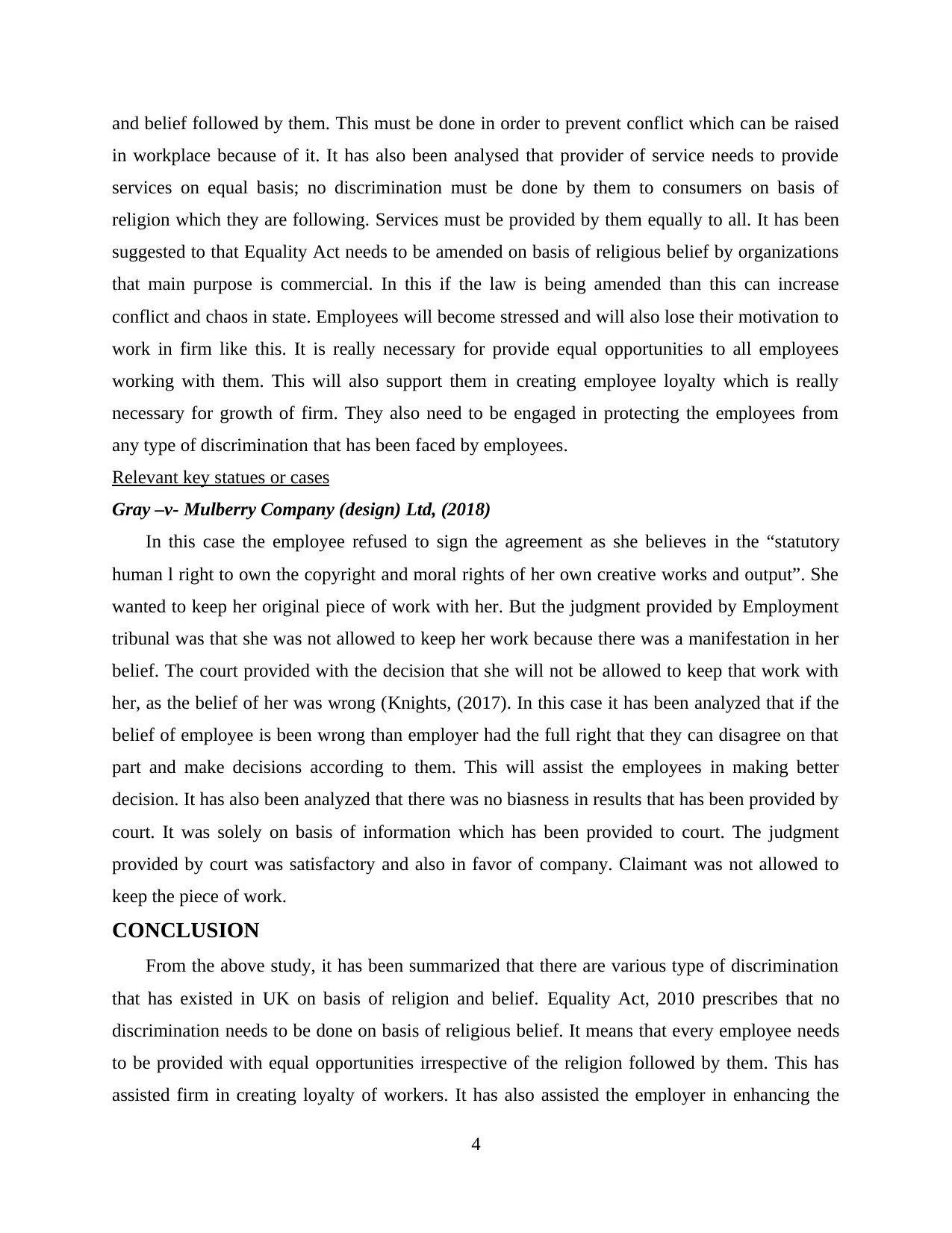
and belief followed by them. This must be done in order to prevent conflict which can be raised
in workplace because of it. It has also been analysed that provider of service needs to provide
services on equal basis; no discrimination must be done by them to consumers on basis of
religion which they are following. Services must be provided by them equally to all. It has been
suggested to that Equality Act needs to be amended on basis of religious belief by organizations
that main purpose is commercial. In this if the law is being amended than this can increase
conflict and chaos in state. Employees will become stressed and will also lose their motivation to
work in firm like this. It is really necessary for provide equal opportunities to all employees
working with them. This will also support them in creating employee loyalty which is really
necessary for growth of firm. They also need to be engaged in protecting the employees from
any type of discrimination that has been faced by employees.
Relevant key statues or cases
Gray –v- Mulberry Company (design) Ltd, (2018)
In this case the employee refused to sign the agreement as she believes in the “statutory
human l right to own the copyright and moral rights of her own creative works and output”. She
wanted to keep her original piece of work with her. But the judgment provided by Employment
tribunal was that she was not allowed to keep her work because there was a manifestation in her
belief. The court provided with the decision that she will not be allowed to keep that work with
her, as the belief of her was wrong (Knights, (2017). In this case it has been analyzed that if the
belief of employee is been wrong than employer had the full right that they can disagree on that
part and make decisions according to them. This will assist the employees in making better
decision. It has also been analyzed that there was no biasness in results that has been provided by
court. It was solely on basis of information which has been provided to court. The judgment
provided by court was satisfactory and also in favor of company. Claimant was not allowed to
keep the piece of work.
CONCLUSION
From the above study, it has been summarized that there are various type of discrimination
that has existed in UK on basis of religion and belief. Equality Act, 2010 prescribes that no
discrimination needs to be done on basis of religious belief. It means that every employee needs
to be provided with equal opportunities irrespective of the religion followed by them. This has
assisted firm in creating loyalty of workers. It has also assisted the employer in enhancing the
4
in workplace because of it. It has also been analysed that provider of service needs to provide
services on equal basis; no discrimination must be done by them to consumers on basis of
religion which they are following. Services must be provided by them equally to all. It has been
suggested to that Equality Act needs to be amended on basis of religious belief by organizations
that main purpose is commercial. In this if the law is being amended than this can increase
conflict and chaos in state. Employees will become stressed and will also lose their motivation to
work in firm like this. It is really necessary for provide equal opportunities to all employees
working with them. This will also support them in creating employee loyalty which is really
necessary for growth of firm. They also need to be engaged in protecting the employees from
any type of discrimination that has been faced by employees.
Relevant key statues or cases
Gray –v- Mulberry Company (design) Ltd, (2018)
In this case the employee refused to sign the agreement as she believes in the “statutory
human l right to own the copyright and moral rights of her own creative works and output”. She
wanted to keep her original piece of work with her. But the judgment provided by Employment
tribunal was that she was not allowed to keep her work because there was a manifestation in her
belief. The court provided with the decision that she will not be allowed to keep that work with
her, as the belief of her was wrong (Knights, (2017). In this case it has been analyzed that if the
belief of employee is been wrong than employer had the full right that they can disagree on that
part and make decisions according to them. This will assist the employees in making better
decision. It has also been analyzed that there was no biasness in results that has been provided by
court. It was solely on basis of information which has been provided to court. The judgment
provided by court was satisfactory and also in favor of company. Claimant was not allowed to
keep the piece of work.
CONCLUSION
From the above study, it has been summarized that there are various type of discrimination
that has existed in UK on basis of religion and belief. Equality Act, 2010 prescribes that no
discrimination needs to be done on basis of religious belief. It means that every employee needs
to be provided with equal opportunities irrespective of the religion followed by them. This has
assisted firm in creating loyalty of workers. It has also assisted the employer in enhancing the
4
⊘ This is a preview!⊘
Do you want full access?
Subscribe today to unlock all pages.

Trusted by 1+ million students worldwide
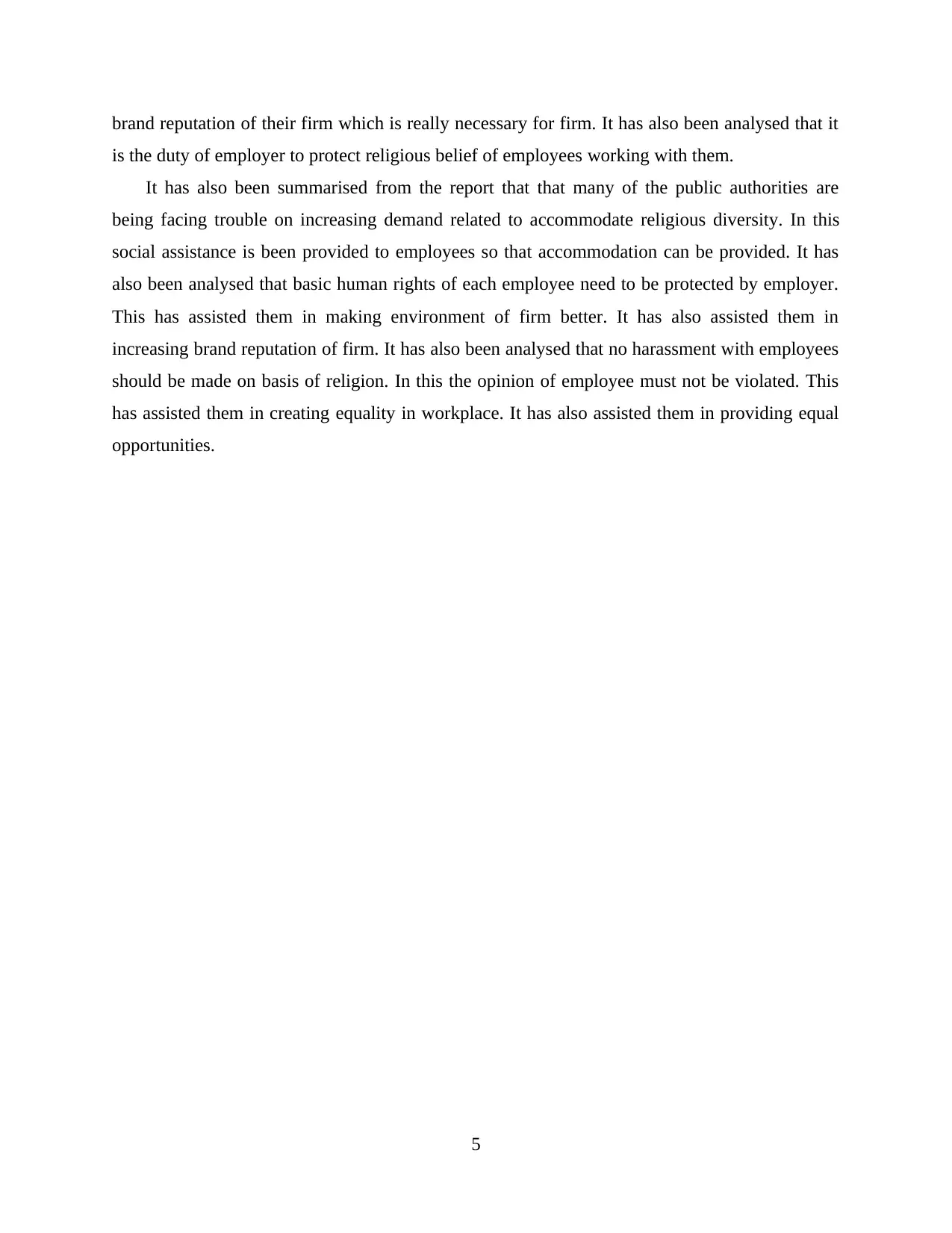
brand reputation of their firm which is really necessary for firm. It has also been analysed that it
is the duty of employer to protect religious belief of employees working with them.
It has also been summarised from the report that that many of the public authorities are
being facing trouble on increasing demand related to accommodate religious diversity. In this
social assistance is been provided to employees so that accommodation can be provided. It has
also been analysed that basic human rights of each employee need to be protected by employer.
This has assisted them in making environment of firm better. It has also assisted them in
increasing brand reputation of firm. It has also been analysed that no harassment with employees
should be made on basis of religion. In this the opinion of employee must not be violated. This
has assisted them in creating equality in workplace. It has also assisted them in providing equal
opportunities.
5
is the duty of employer to protect religious belief of employees working with them.
It has also been summarised from the report that that many of the public authorities are
being facing trouble on increasing demand related to accommodate religious diversity. In this
social assistance is been provided to employees so that accommodation can be provided. It has
also been analysed that basic human rights of each employee need to be protected by employer.
This has assisted them in making environment of firm better. It has also assisted them in
increasing brand reputation of firm. It has also been analysed that no harassment with employees
should be made on basis of religion. In this the opinion of employee must not be violated. This
has assisted them in creating equality in workplace. It has also assisted them in providing equal
opportunities.
5
Paraphrase This Document
Need a fresh take? Get an instant paraphrase of this document with our AI Paraphraser
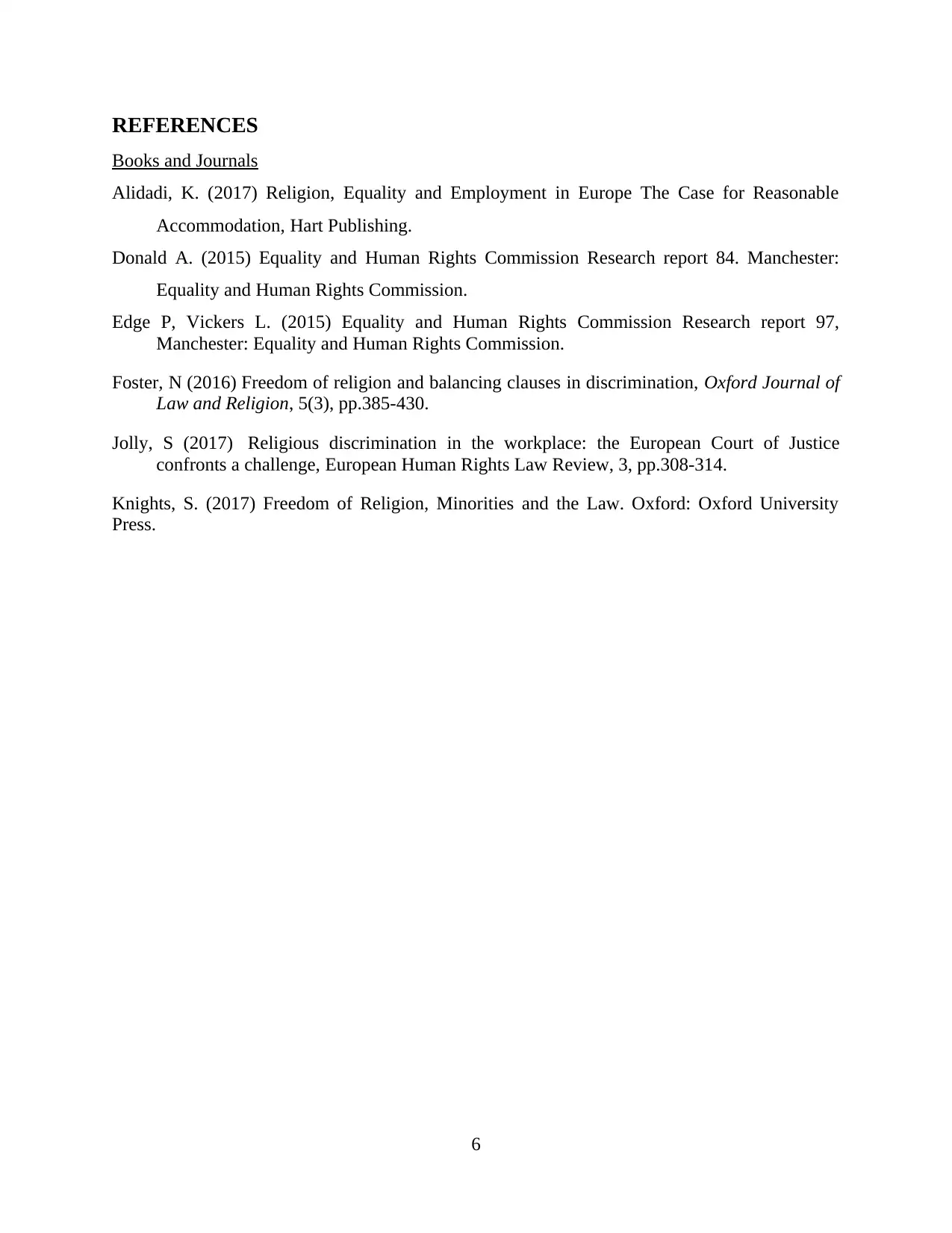
REFERENCES
Books and Journals
Alidadi, K. (2017) Religion, Equality and Employment in Europe The Case for Reasonable
Accommodation, Hart Publishing.
Donald A. (2015) Equality and Human Rights Commission Research report 84. Manchester:
Equality and Human Rights Commission.
Edge P, Vickers L. (2015) Equality and Human Rights Commission Research report 97,
Manchester: Equality and Human Rights Commission.
Foster, N (2016) Freedom of religion and balancing clauses in discrimination, Oxford Journal of
Law and Religion, 5(3), pp.385-430.
Jolly, S (2017) Religious discrimination in the workplace: the European Court of Justice
confronts a challenge, European Human Rights Law Review, 3, pp.308-314.
Knights, S. (2017) Freedom of Religion, Minorities and the Law. Oxford: Oxford University
Press.
6
Books and Journals
Alidadi, K. (2017) Religion, Equality and Employment in Europe The Case for Reasonable
Accommodation, Hart Publishing.
Donald A. (2015) Equality and Human Rights Commission Research report 84. Manchester:
Equality and Human Rights Commission.
Edge P, Vickers L. (2015) Equality and Human Rights Commission Research report 97,
Manchester: Equality and Human Rights Commission.
Foster, N (2016) Freedom of religion and balancing clauses in discrimination, Oxford Journal of
Law and Religion, 5(3), pp.385-430.
Jolly, S (2017) Religious discrimination in the workplace: the European Court of Justice
confronts a challenge, European Human Rights Law Review, 3, pp.308-314.
Knights, S. (2017) Freedom of Religion, Minorities and the Law. Oxford: Oxford University
Press.
6

7
⊘ This is a preview!⊘
Do you want full access?
Subscribe today to unlock all pages.

Trusted by 1+ million students worldwide
1 out of 9
Related Documents
Your All-in-One AI-Powered Toolkit for Academic Success.
+13062052269
info@desklib.com
Available 24*7 on WhatsApp / Email
![[object Object]](/_next/static/media/star-bottom.7253800d.svg)
Unlock your academic potential
Copyright © 2020–2026 A2Z Services. All Rights Reserved. Developed and managed by ZUCOL.




